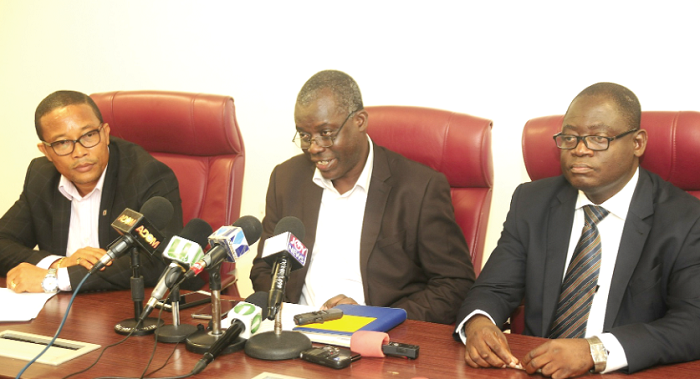
Current power outages not ‘dumsor’ — ECG
The Electricity Company of Ghana (ECG) has declared that the current power outages are not indications of power crisis or the return of load shedding, otherwise known as “dumsor.”
Advertisement
Rather, the management said the recent power outages were as a result of distribution challenges which arose from scheduled maintenance of some equipment or repair of technical faults of some of their equipment.
“Admittedly, we have taken note of series of outages in some areas within our distribution system, but we wish to state as a matter of fact that it is not load shedding,” it said.
Addressing the media on the situation in Accra yesterday, the Director of Operations at the ECG, Mr Tetteh Okine said the power distribution company was receiving enough energy for supply.
The power crisis trend
Some areas in Accra have been experiencing power outages since last week. The situation has raised concerns and fears that the country might be heading back to the era of dumsor when consumers had to go through days and nights of load shedding.
Ghana experienced power crisis in the last three years as a result of a shortfall in the generation of power at the Akosombo Hydroelectric Dam and inadequate fuel supply to power thermal plants.
Although Mr Okine declined to comment on the generation situation, he said assurances from the power generators were that “the outlook for the future of power supply was bright.”
The reasons for the outages
Explaining the reasons for the outages, Mr Okine said some of ECG’s equipment had to undergo regular maintenance, while there were impromptu shut down of the bulk supply points and substations due to emergency faults.
Additionally, the director said faults and accidents on some ECG lines and transformers as a result of construction works and destruction of transformers to steal copper coils were some of the inevitable causes of power distribution system.
“For instance, during the last weekend, the Mallam bulk supply point and Baatsona substation faced some challenges which required immediate attention, causing power outages at some parts of the western and eastern part of Accra for some hours,” he said.
Also, Mr Okine said Oyarifa in the Dodowa District of the ECG was also facing erratic power challenges due to faults in their transformers.
In some instances where the ECG had scheduled to work on a substation or equipment, he said the company usually notified the public through various media platforms.
But, when there was an emergency situation where a fault was detected, Mr Okine said they had to quickly shut down the substation to rectify the fault so that it did not become worse.
Additionally, he stated that the stability of the power situation over the past months had also caused an increase in the consumption pattern.
We are fixing the problems
While some of the faults had been rectified in some areas, including Mallam and Baatsona, Mr Okine said other areas which required installation of additional and new transformers were ongoing, including Oyarifa.
To reduce the outages, he said a decision had been made to ensure that all planned maintenance works were completed by November this year.
“We cannot promise an absolute end the challenges because there are some situations over which we do not have control, however, we will try to minimise it”, he added.
Mr Okine urged customers to alert the company when they experienced outages since they could not determine faults everywhere.
The load shedding
As part of the effort to manage the power during the period of power crisis, a load shedding management plan was drawn under which consumers endured 12-24 hours daily of blackout during the period.
On December 30, 2015, a statement from the Ministry of Power announced the end of the load management in line with the promise made by the then Minister of Power, Dr Kwabena Donkor that he would resign if he was unable to end ‘dumsor’ by the end of 2015.
The situation improved early 2016, however, again, in June and July, 2016, the challenges with the power situation resurfaced due to power deficit of more than 300 megawatts (MW).
The situation was attributed to the cut in gas supply from Nigeria Gas (N-Gas) to the Tema enclave following debts owed by the Volta River Authority (VRA) and reduction in gas supply from Ghana Gas to the Aboadze power enclave as a result of challenges that confronted the Floating Production Storage and Offloading (FPSO) vessel, the FPSO Kwame Nkrumah.



